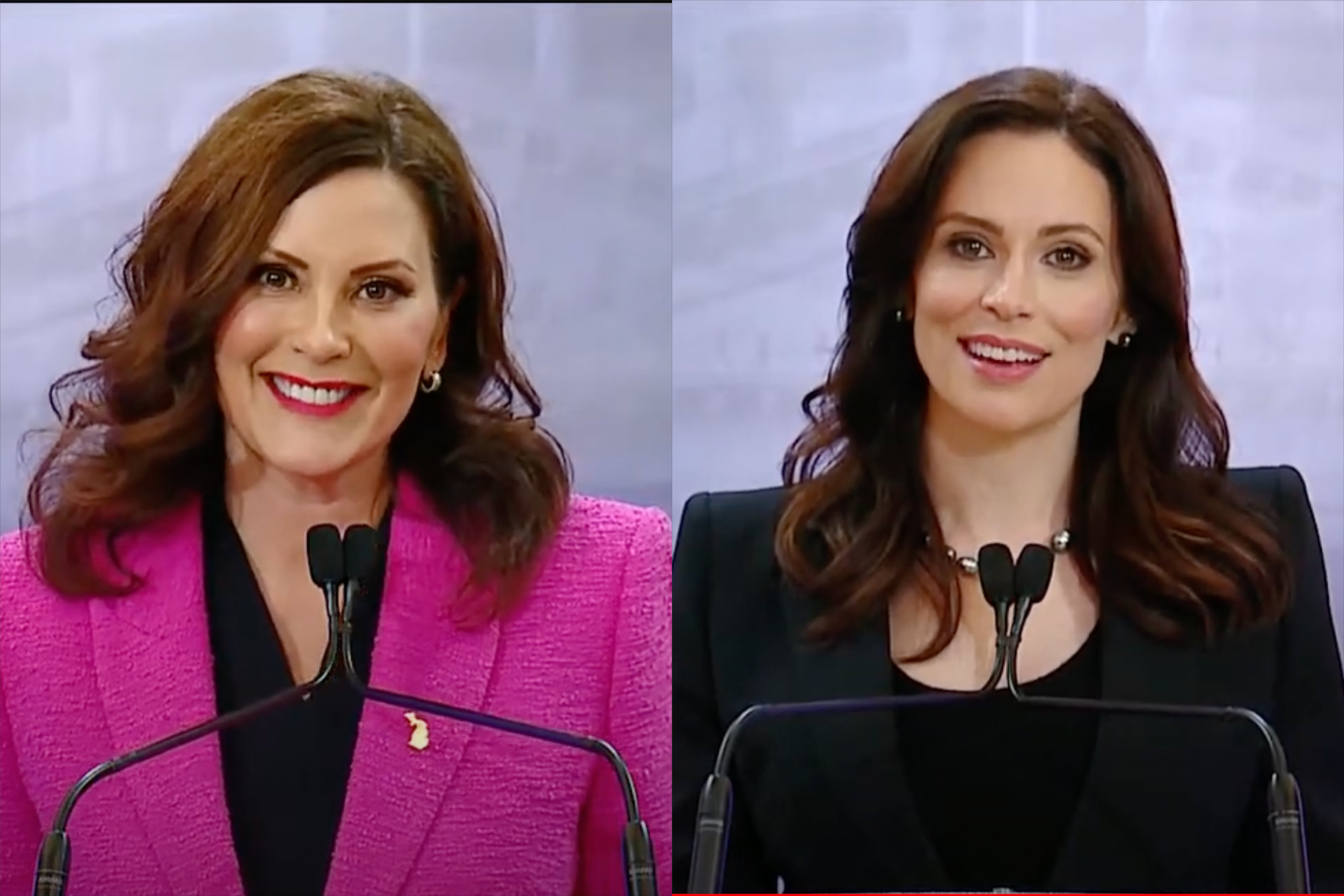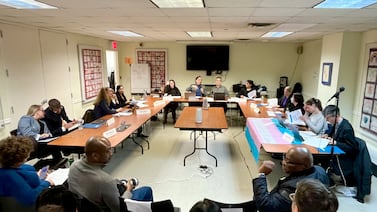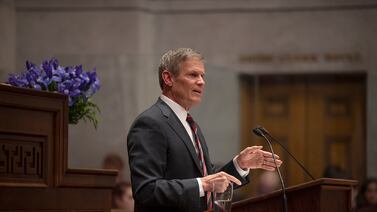Tudor Dixon and Gov. Gretchen Whitmer traded barbs over books, guns, and test scores Tuesday during an acerbic debate at Oakland University.
Dixon, the Republican challenger from Norton Shores, accused the incumbent Democratic governor of driving down test scores by keeping schools closed too long during the pandemic.
Whitmer accused Dixon of promoting a plan that would divert money from public schools to for-profit private ones.
It was the second and last debate before the Nov. 8 election. Whitmer is leading in the polls, but Dixon has begun to close the gap, according to Real Clear Politics.
The hour-long debate came a day after National Assessment of Education Progress test scores showed Michigan students declined in every grade level since the last round of tests in 2019 before the pandemic. Declines in fourth-grade reading were particularly steep.
The National Assessment of Education Progress, or NAEP, was given to a representative sample of students across the country between January and March to test reading and math proficiency. Known as “the nation’s report card,” NAEP allows state-to-state comparisons.
Dixon blamed the decline on school closures Whitmer ordered to prevent the spread of COVID.
“We are not a Top 10 state,” Dixon said. “We’re not even close. We are actually a bottom 10 state.”
Michigan fourth graders ranked 40th nationally in reading and 35th in math on the NAEP exam. Eighth graders were 23rd in reading and 25th in math. But the rankings can be misleading, since scaled scores in 27 other states were very similar to Michigan.
Test scores are horrible, Dixon said, and Michigan has been slower than other states to implement comprehensive tutoring programs that would help. She has proposed hiring back retired teachers to provide every student 25 hours of tutoring next school year.
She said the state needs to help students get back on track after they were forced to learn online during the pandemic.
Whitmer defended school closures.
“The reason kids were out of school during the pandemic was because we were working off of knowledge from 1918, when kids died from the last global pandemic,” she said. “As a mom, I was thinking about saving the lives of our kids.”
She said the closures lasted three months, which Dixon disputed.
“I think I just heard an audible gasp around town” when she said that, Dixon said. “This is shocking to me that she thinks that schools were only closed for three months — or maybe she thinks she can convince you that schools were only closed for three months, but you know better because your students are the ones that are so desperately behind.”
Whitmer ordered schools closed from mid-March 2020 until the end of that school year. In November of that year, the state ordered high schools closed for nearly a month. Some schools in the state were closed for in-person instruction much longer than the state ordered, but those were individual decisions by local elected school boards.
Whitmer said an unprecedented boost in this year’s school aid budget will provide for tutoring, smaller class sizes, mental health counseling, and literacy coaches that will improve education.
Whitmer also said public schools would suffer under Dixon.
“The problem is, if Mrs. Dixon is elected, she and her biggest funder, Betsy DeVos, will be writing the education budget,” Whitmer said. “And their plan is to take half a billion dollars out of our public school system. If you want to get kids to Top 10 in literacy, draining the school aid fund is not going to get us there.”
The candidates also shared vastly different plans for keeping schools safe from violence. The back-and-forth came a day after the teenager accused in last year’s Oxford High School shooting pleaded guilty to killing four and wounding seven.
Whitmer said she supports background checks, secure storage requirements, and red flag laws that would allow police to temporarily seize guns of people believed to be a present danger to themselves or others.
Dixon wants schools to have armed guards, single points of entry, and training to help educators identify children struggling with mental illness.
“I want to make sure that kids are safe, and I don’t want kids in a sitting-duck zone where the only person that has a weapon is the shooter that is going in to take their lives,” Dixon said.
She also wants the state to implement recommendations from a 2018 School Safety Task Force that called for incentives for school counselors, standardized floor plan maps for schools, more thoughtful active-shooter drills, more training for school resources officers, and more.
Whitmer responded pointedly.
“There was a school shooting in Missouri yesterday in a district that had exactly what she just described: one point of entry, armed guards in the school, and people are dead,” Whitmer said.
She circled back to guns later in the debate, accusing Dixon of worrying more about books in schools than weapons in them.
“Do you really think books are more dangerous than guns?” Whitmer asked her. “Do you really think that books pose a greater danger to our kids than gun violence does?”
Dixon has made book banning a campaign issue, calling sexually explicit material in some school libraries pornographic.
“These are books that are describing to children how to have sex, and parents are outraged about it across the state,” she said. “I stand with those parents that want to make sure we go back to the basics of reading, writing, and math in our schools.”
Whitmer said parents have the right to tell teachers they don’t want their children to have access to particular lessons or materials. She said Dixon is using the local issue as a distraction from more important issues.
They also offered differing perspectives on abortion, inflation, tax plans, balanced budgets, energy costs, the opioid epidemic, and state infrastructure.
Whitmer and Dixon’s first debate was Oct. 13 in Grand Rapids. The two also responded separately to questions, but did not debate, last week at the Detroit Economic Club.
Tracie Mauriello covers state education policy for Chalkbeat Detroit and Bridge Michigan. Reach her at tmauriello@chalkbeat.org.








